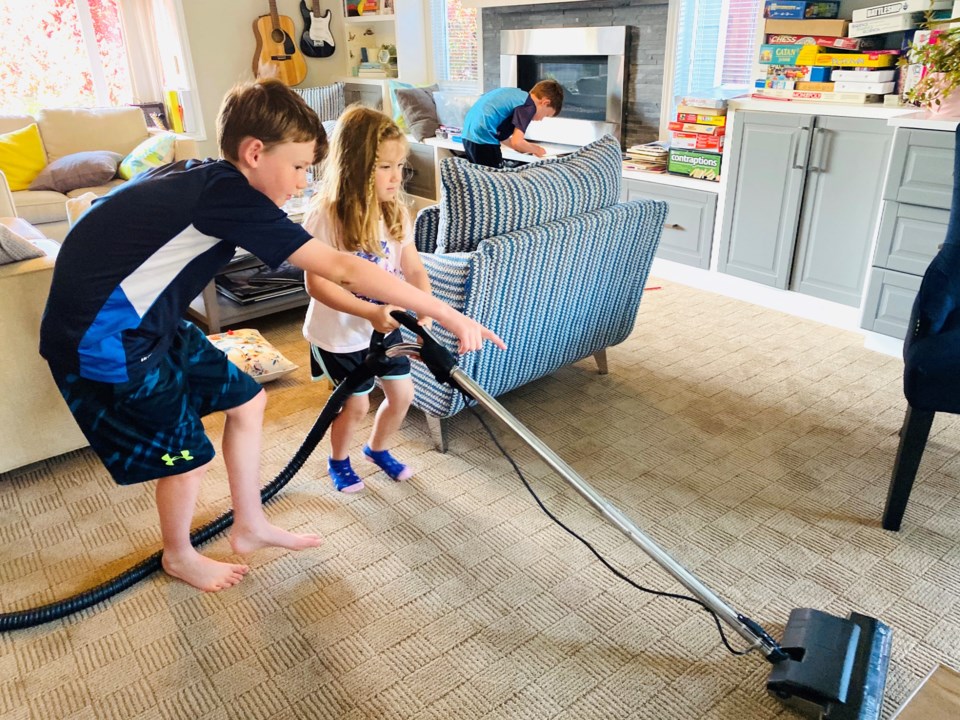Three weeks ago, Linda Waithman wasn’t so confident about having her kids learning at home with in-class instruction suspended indefinitely, and she wonders whether next week things will go as smoothly.
But for now, her family of five has found a rhythm to their days.
This was after some trial and error figuring out technology and how to best communicate with the school.
Waithman worked as a medical/legal occupational therapist before the COVID-19 outbreak, but with the courts closed, her work ended so she has gone back to working 25-30 hours per week with clients – albeit remotely.
She works in the afternoon while her husband works in the morning and she counts herself lucky to have a flexible schedule.
But having a routine, a plan for the week and then taking time off on the weekend has been “at the forefront of us being able to enjoy this time together,” Waithman explained.
“Have some work, have some fun, have some play time,” she said.
At first, Waithman had visions of her entire family on laptops working a few hours a day. That is not how things have panned out, rather, they are out and about doing hands-on projects.
Her family decided to opt out of using the school district portal, which seemed bogged down, and went back to “old-fashioned email,” something her sons’ teachers at Homma elementary were immediately willing to do, Waithman explained.
And when writing a weekly blog became too cumbersome, her sons’ teachers switched to weekly phone calls to check in.
Waithman said her work as an occupational therapist informs her philosophy on bringing up children, and this is being applied to this home-schooling situation as well.
“Our family really believes the primary occupation for children is play — and just playing for the sake of playing,” she said.
The school has been giving her sons a variety of tasks and Waithman poses the question:
“What calls you today?” They pick one or two out of four, which has cut their schooling to about 30 to 45 minutes a day.
“They love it and I love it, and I’m not supervising a couple of hours of schoolwork a day,” Waithman said.
Her sons’ four-year-old sister is out of preschool because of COVID-19 and, instead, she is watching and learning from her brothers.
“She follows along in their shadows and pretends to do what they’re doing,” Waithman said.
Jennifer Freeman, whose children also attend Homma elementary, called the teaching community supporting her family in their home-schooling “a pool of the best minds.”
As her family floundered for the first few weeks —) while she and her husband kept working — trying to figure out how to teach their children, the school came up with options and suggestions for learning, including good technological tools, but no pressure to do everything.
Freeman said there’s a lot of “mom guilt” about not being a good enough teacher. But the support from the school – including concern about how their family is doing – has been “amazing.”
The concerns for her two sons – three years apart – are different, though.
Usually, there is concern around a “summer slip,” but Freeman is worried this is going to turn into a “spring-summer-everything slip” for her Grade 2 son, missing out on those basic skills they were just learning.
For her older son, in Grade 5, she’s worried about him missing out on the social aspect of school.
“School was really the place for him to connect with his peers and other kids,” she said.
She hopes when he goes to Grade 6, he will rekindle those friendships.
Her older son, however, has found “passion projects” while learning at home, creating stop motion movies, even making one on fractals – a forever repeating pattern.
Freeman calls this time the “great pause” and she feels it has brought her family closer together.
When asked what they miss, Waithman’s kids will say they miss their friends and going to school, but then they always add that they love being at home.
“It melts my heart,” she said.
But there are still conflicts over schoolwork, which has become another chore.
And her sons don’t understand why they can’t see their grandmother who lives just two blocks away.
But being at home for such an extended period of time has taught the Waithmans to give themselves space and time as a family, to be more home and community oriented, not always planning a grand escape from home.
As for next year, Waithman said her kids will be “where they need to be.”
She said as long as they are safe and protected, they will be okay.



